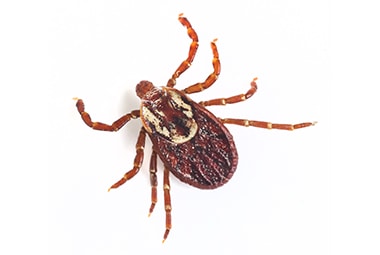SCORES & OUTDOORS: Surveillance report from UMaine Extension Tick Lab highlights tick-borne disease risk
 by Roland D. Hallee
by Roland D. Hallee
In 2024, University of Maine Cooperative Extension Tick Lab processed 4,776 tick submissions including samples from 398 towns, representing all of Maine’s 16 counties. The majority (3,650) were identified as deer ticks, also known as blacklegged ticks, while American dog ticks accounted for 1,045 samples. Laboratory testing showed that 41.5 percent of the deer ticks analyzed carried Borrelia burgdorferi, the bacterium that causes Lyme disease, while significant proportions also carried Babesia microti (12 percent), Anaplasma phagocytophilum (9.7 percent) and Powassan virus (1.1 percent).
Most tick exposures occurred close to home with 68 percent reported from the submitter’s own property. Yardwork was the most commonly cited activity at the time of tick encounter, accounting for one‑third of all incidents. Despite this, only 16 percent of individuals reported using any protective measures against ticks.
“These data confirm that Lyme and other tick‑borne diseases remain a serious, statewide public health concern,” said Tick Lab Coordinator Griffin Dill, who urged residents to wear protective clothing, apply repellents and conduct tick checks after outdoor activities. The full 16-page report is available on the Tick Lab’s website.
Thanks to ongoing funding supported by the Governor and Maine Legislature, the UMaine Extension Tick Lab keeps its comprehensive tick testing service affordable at just $20 per tick, ensuring that cost is not a barrier to public participation.
Through educational outreach programs including the 4‑H Tick Project, the Tick Lab engages youth and communities statewide, sharing practical prevention strategies through webinars, workshops and print resources.
Lyme Disease
Lyme disease is the most known of the tickborne illnesses. It is transmitted through the bite of an infected deer tick. Cases of Lyme disease have more than tripled since 1993 according to the Centers for Disease Control and Prevention (CDC).
Lyme disease causes a rash that looks like a bullseye. It also causes flu-like symptoms, such as fever, chills, headache, fatigue, and muscle aches.
Lyme disease may evolve through phases, which can overlap and cause ever worsening symptoms that may involve the skin, joints, heart, or nervous system.
Antibiotics are effective treatments for Lyme disease when detected early.
Protect Yourself
Remember, ticks can typically be found in grassy, brushy, or wooded areas, or on animals. They typically wait on the tips of branches, leaves, or tall grasses for prey to walk by.
A tick’s saliva has anesthetic properties, so you may not even realize you’ve been bitten.
When spending time outdoors, be aware of your surroundings and the possibility of ticks in the area. Wear insect repellent with DEET. If you must be in a grassy or wooded area, wear long sleeves and long pants. Tucking your pants into your socks for extra protection. Shower immediately after being outside. Ask someone check your body for ticks. If you find a tick on your body, time is of the essence! Use fine-tipped tweezers to grasp it by the head as close to the skin as possible. Gently pull the tick upward, making sure not to twist or squeeze it. Wash and disinfect the area with rubbing alcohol or soap and water.
Save the tick!
Take a photo of the tick and submit to a tick identification website which can inform you of the potential pathogens it could be carrying and whether you might want to have the tick tested as a further assessment of disease risk.
Protection is the key, however, if you do come in contact with a tick, don’t wait. If you’re not sure, seek professional medical help.
More information on ticks in Maine and how to submit tick samples to the lab is available online at ticks.umaine.edu or by contacting 207.581.3880; tickID@maine.edu.
Roland trivia question of the week:
Which NBA team has won the most championships?
Responsible journalism is hard work!
It is also expensive!
If you enjoy reading The Town Line and the good news we bring you each week, would you consider a donation to help us continue the work we’re doing?
The Town Line is a 501(c)(3) nonprofit private foundation, and all donations are tax deductible under the Internal Revenue Service code.
To help, please visit our online donation page or mail a check payable to The Town Line, PO Box 89, South China, ME 04358. Your contribution is appreciated!



Leave a Reply
Want to join the discussion?Feel free to contribute!